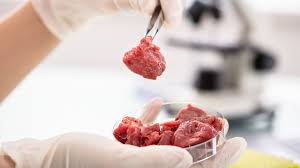
The U.S. Food and Drug Administration has issued an immediate recall on several brands of lab-grown meat after scientists detected unidentified DNA sequences in the cultured protein. The recall affects products distributed by major companies, including BioMeat, Future Protein and EcoHarvest, all of which have gained popularity as sustainable alternatives to traditional meat.
The recall was triggered by an independent study conducted by researchers at Johns Hopkins University, who were analyzing the genetic composition of lab-grown beef when they discovered unknown, non-animal DNA embedded in the cells. Initial reports suggest the presence of genetic material that does not match any known species on Earth, raising concerns over potential health risks. “It doesn’t belong to cows, chickens, or even plants. We are currently investigating whether it’s a mutation, contamination, or something entirely new to science,” says Dr. Cartwright. The FDA has since launched an urgent probe into the matter, suspending the sale of affected lab-grown meat products nationwide. Consumers who have purchased these products are advised to dispose of them immediately or return them to the place of purchase. “Now I can assure you that the meat we serve is completely natural and healthy for the students here,” Ms. Beverly said when asked about the meat in the cafeteria.

Adding to the growing panic, several consumers have reported bizarre side effects after consuming the recalled products. Some claim they experienced a metallic aftertaste, while others described a tingling sensation in their mouths that lasted for hours. A few extreme cases have involved individuals developing temporarily heightened senses, with one woman in Georgia claiming she could “hear electricity” after eating a lab-grown chicken sandwich. While health officials have yet to confirm a direct link between these symptoms and the unidentified DNA, the FDA has advised hospitals to monitor cases of unexplained allergic reactions or neurological effects. In response to the crisis, lab-grown meat companies have halted production and insist their products undergo rigorous testing before distribution. BioMeat, one of the affected brands, issued a statement claiming that the contamination may have resulted from an experimental growth accelerator used to speed up cell development.
Meanwhile, lawmakers are now questioning whether lab-grown meat should be subjected to stricter regulations. Some critics argue that the rushed approval process for cultured meat may have overlooked potential risks. As the investigation continues, consumers are advised to stick to traditional meats and plant-based alternatives until more information is available. The FDA is expected to release preliminary findings within the next two weeks





